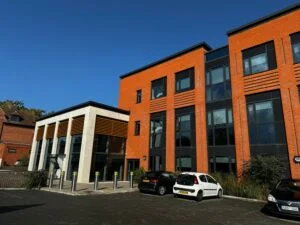
An impressive, modern building, this new flagship college facility, designed by Lee Evans Partnership for East Kent College Group (EKCG), provides exciting state-of-the-art facilities and increases the college’s presence within the town.
Situated to the front of the existing campus and built using an insitu concrete frame structure, the building features extensive brickwork designed to match the surrounding red-brick Victorian buildings. The new facility has been successfully integrated with other college buildings on site via a new pedestrian linkway. The original chapel has been left intact and become part of the new building, providing an atmospheric and beautiful creative performance space. The building provides excellent modern teaching environments, enabling them to deliver high-quality further education to students.
Active Digital was impressed to see some of the onsite facilities which are available for all students to develop their digital skills in image editing, video editing, game development and 3D design. Students also have access to the industry standard software and programmes needed to successfully understand the world of creative computing, such as the Adobe Creative Suite, Blender, Unity and Unreal Engine.

Furthermore, Folkstone College is really helping to shape our next generation and showing students how they can use digital technologies through various career roles. The facilities at Folkstone College are impressive and are equipped with revolutionary VR facilities and immersive classrooms, which we got to see first-hand on our visit.
Access to the internet and devices alone is insufficient for students; they require training in responsible and meaningful technology use. Enhanced internet provision in schools and colleges positively impacts learning outcomes.
Research by The Economist Intelligence Unit indicates that even minor improvements in school connectivity can greatly enhance student learning by providing faster, more reliable, and affordable internet. This not only elevates the quality of education and access to resources but also boosts digital literacy. Zohra Yemerche from Ericsson highlights the rapid digitisation of the world, noting the evolving skills needed in the job market.
According to the World Economic Forum (WEF), 65% of today’s primary school students will be working in a job that currently doesn’t exist.1 And that, says Ms Yemerche, should make us think now about the skills we are teaching the world’s children. She continued, “if we don’t contribute to building a digitally skilled workforce,” she says, “we are going to have an even wider gap between those who have the skills needed to get a good job and those who don’t.”
Active Digital has recently supported local charities in the local Kent area with their Digital Divide. This project has seen Active Digital supply Mi-Fi Units and SIM card with 2GB data per user for their students and young leavers
If digital divide is not tackled effectively, there is a risk that technology will continue to deepen inequalities. There is widespread agreement that tech was essential to delivering education during the Coronavirus pandemic, but there is less clarity on how this approach will be used in the long-term. As the pandemic subsides, the need for technology will only grow – in turn demanding a long-term approach that delivers digital inclusion as a key enabler to realising children’s rights to education, information and to leisure, play and culture.
Some of this research played a key part in motivating us to reach out to local charities, to see how we can help with their digital divide. In turn, we have collaborated to provide free internet this summer to young people in the UK who wouldn’t normally have access. This will allow them to access the internet to support them in their learning or access in-house social channels to stay connected.
Read more about the work we have done with Festival of the Girl
Notifications